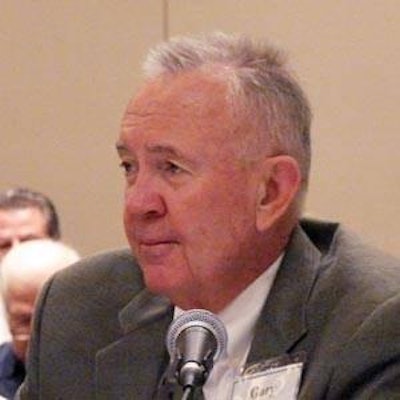
Current conditions offer good as well as disturbing news for egg producers, according to speakers at the United Egg Producers annual meeting last month in Chicago. On the plus side are the sustained excellent prices for eggs enjoyed by all. On the negative side, a great deal of work remains to be done on environmental and animal welfare issues.
UEP outgoing Chairman Dolph Baker discussed the excellent year egg producers have had price wise, while President and CEO Gene Gregory commented on the challenges facing states where animal activists are attempting to either place a cage ban on the ballot, as is the case in California, or create a legislative action to eliminate cages. Some state challenges so far have been won by the industry, but the California issue seems to have gained some momentum and will require some extra work in the near future by the entire industry, he said.
Changing Ag Climate
Charlie Arnott, president of CMA Consulting, discussed the changing climate in agriculture. He emphasized the word "trust" and how consumers currently view industries they buy from. Today, the most credible entity is oneself, followed by one's doctor, with government and industry down on the list. This points out the need to gain the trust of consumers when promoting products and, according to Arnott, science-based knowledge is not the whole answer.
He feels agriculture has lost its "social license" and the industry needs to work to regain it with a new set of rules. Arnott's organization, the Center for Food Integrity (CFI), has a mission to build consumer trust. He encourages all agricultural groups to join CFI.
Answering a question from the board, Arnott suggested that a frontal attack on the animal activists is probably not worthwhile. He emphasized again, as was pointed out several times during the meeting, that the Humane Society of the United States (HSUS) alone has funding of more that $120 million and 10 million members. This is formidable opposition. He said farming is now considered industrial and is no longer the traditionally known farm model. He added that the consumer is looking for permission to believe and the industry needs to regain this trust.
Legislative Issues
A panel discussion relating to state legislative issues was moderated by Kevin Haley, UEP counsel. Members of the panel were Debbie Murdock, Pacific Egg and Poultry Association, California; Gary West, California; Chris Herr, Pennsylvania; Derek Yancey, Colorado; Randy Green, UEP Washington Representative; and Mitch Head, with the Golin Harris public relations firm.
All participants are involved in issues facing their states and the efforts of animal welfare activists to influence how eggs are produced. In California, activists are getting signatures to include a ban on cages on the November 2008 ballot. Various options are available to producers there, all of which will take additional funding. There is a tough battle looming in California for egg producers, with the entire industry joining in.
In Pennsylvania, the activists lost their case following an incident where a member of their group was hired by a producer, did a story with photos and then was found out. The bottom line of this was expensive as it went to court and took some time to unravel.
In Colorado, as discussed by panelist Derek Yancey, the state legislature is considering introducing legislation to ban cages, based on lobbying efforts of animal activists. The state has a strong Right-to-Farm Act on the books but much education through radio and TV will be necessary to stop anti-cage challenges.
UEP is helping educational efforts by conducting a meeting in Denver in November with foodservice and grocery personnel. A similar meeting in Arizona helped defeat the animal welfare activity in that state. As part of the meeting in Arizona, attendees were taken to an egg production complex and shown the actual operation. A similar visit is planned for the Colorado event. Producers have been encouraged to show decision makers their farms. It has proven to be an effective tool.
All States to be Targeted
Haley explained that UEP held a brainstorming session in Atlanta prior to this meeting. Several pertinent factors emerged from this meeting that relate to the activists' efforts with the states. He commented that sooner or later all states will be targeted, including those that do not have egg production. The industry needs to cultivate and educate all local and state decision makers before the activists do, he said.
Haley added that the industry needs to understand and monitor egg activist activities better, and work with local organizations, such as Farm Bureaus. The egg industry also needs to work with all groups, not just the people that are openly sympathetic to its cause. Haley emphasized that some liberal groups are on the side of animal agriculture. These groups need to be identified and worked with. Do not concede the moral high ground to the activists, he said.
Factors that enter into the overall equation and should be presented include the scientific facts that have been obtained, the food safety advantages that exist, environmental controls, and the positive economics that exist when eggs are produced in cages.
Haley said that if cages are eliminated, egg prices will soar, affecting those who are least able to afford the nutritional value they offer. Haley pointed out that there are many avenues to take to convince the powers that be that current egg production is done properly and should continue for the good of the people. For example, changing how it is done would put many farmers out of business and cause the loss of jobs. No politician wants this, he said.
Proactive on Legislative Front
Green said that UEP can be a great help by being proactive on the legislative front. For example, he said, UEP can help with model statutes designed to preserve the ability to use cages for production. The purpose of this alternative legislation is two-fold, to provide a positive strategy and to require activists to debate on industry terms.
Head outlined a new proactive and interactive approach for the industry. All future discussions at the meetings will involve public relations efforts in some form. Golin Harris will continue with the core projects and state campaigns. The firm will study consumer confidence research and act upon it. As of now, consumer trust is declining, according to Head. Reversing that trend will be a prime area of focus in the future. Some change of direction of the mechanisms of communication are needed, he said.
Going Global
Fred Cook, president and CEO of Golin Harris, said that all U.S. companies should be going global, or go home. Jobs are leaving the country and multi-cultural shifts are taking place. He said that in 2050, one out of four U.S. residents will be Hispanic and it is important to change to accommodate this trend. Also beginning to be an influence now, the aging population will continue to change in the next 40 to 50 years. Their spending patterns are different. Aging people now want things that make them happy and industry needs to learn how to talk to them. Another concern, Cook said, is that worldwide healthcare costs will double by 2050. An interesting statistic, he noted, is that in Japan, workers versus retirees are about 50/50.
Cook commented on the public's perception of various groups in the United States. Number six on the favorable list is the HSUS, higher than the American Heart Association. This points up the fact that the egg industry, as well as others, need to build up their images before being attacked. As was discussed several times at this meeting, people are fed up with problems in government and business and are looking for truthful, concise, clear statements from real people with authentic stories. Cook stated that the winners will be the ones that understand these shifts. He called it an opportunity in marketing and public relations.
It will become even more necessary to find credible sources of information and understand the means of communicating in an effective way. Gregory followed Cook's remarks by stating that the industry needs to find new ways to get the truth out to the right people and that opponents are using all of their resources to push their cause.
Committee Reports
Public Relations Committee Chairman Paul Sauder presented, and the board passed, two motions from their committee meeting: a 1 cent per bird assessment for public relations to assist state and local programs, and an authorization for UEP staff to solicit funds from members and UEA for additional public relations activities.
Mark Oldenkamp, Chairman of the Animal Welfare Committee, reported on subjects discussed at the committee meeting, with two motions passed at the board meeting: assessments for the certified program will remain the same for 2008; and the updated 2007-08 UEP Animal Husbandry Guidelines were approved. The guidelines, as explained by Oldenkamp, are a work in progress as research continues by the scientific committee. Oldenkamp also remarked about the successful consumer affairs meeting held in Arizona and the one scheduled for Colorado in November.
The 2007-08 Guidelines includes a cage-free section and will include a breeder/hatchery/pullet section. There was also a great deal of discussion at the committee meeting about the audit programs.
Gene Gregory suggested pet owners should be approached for support due to the fact that animal activists are advocating that all pets be spayed and neutered. He also stated that a retail conference such as those in Arizona and Colorado be held in California.
Cage-Free Issues
Several pages listing problems that could occur with birds not housed in cages were distributed. Attendees were urged to know and understand these problem areas and use the information in the fight against the anti-cage efforts.
The information is broken down into two sections: the first concerns birds confined in a building, the second is for birds with outside access.
Potential cage-free problems range from diseases being more easily contracted when birds are on litter, to air quality management difficulties, to less control over internal parasites and rodents. Not all problems are public health issues but all could impact animal welfare concerns.
Environmental Issues
UEP Vice President Chad Gregory asked producer attendees how many completely understood the rules of the Clean Water Act as it may apply to them. No one raised a hand. UEP has published a booklet called Water Care, Clean Water Act CAFO Rule Readiness Evaluation.
The research project, monitored by Purdue University and covering three areas of the country, is going well with information going to the Environmental Protection Agency (EPA) quarterly. Members of the committee from different states were asked to comment on their experiences with water concerns and their state activities. There were very diverse remarks with some states being very active while others were relatively quiet.
It is evident that all animal species in the various states are being affected with environmental issues. Two motions from the environmental committee were passed by the board. One authorized more money for the legal fund to challenge EPA in their "duty to apply" position in the CAFO final rule, and the second allotted additional funds to the legal fund to challenge a congressman's effort to remove "Navigable Waters" from the Clean Water Act.
Marketing
The Marketing Committee report was given by Chuck Elste. He said that bird numbers are down, creating the good prices. Higher feed prices could be a reason for lower numbers as producers are reluctant to increase their flocks. He said there could be some additional export restrictions coming which would make it costlier to ship overseas, as well as potential increased energy costs. All could make producing and marketing eggs more expensive.
Motions from the marketing committee included a vote to support the USDA Shell Egg Demand Indicator and a second for members to commit to a donation of eggs to the Harvest Food Bank Network at Easter.
American Egg Board (AEB) President and CEO Joanne Ivy reported that AEB activities are progressing and the organization is searching for new ways to reach the public regarding the consumption of eggs. AEB will re-launch the "Incredible Edible Egg" campaign with a new, simplified nutrition-based message. Some of this promotion will utilize the AEB web site. Advertising media will include television, radio, banner ads, billboards, carton displays, and magazines. Other programs by AEB include work with Foodservice and Retailers Accounts, Production Education, Funding Research and Integrated Nutrition.
Don McNamara, head of the Egg Nutrition Center (ENC) gave attendees an update on the activities and programs of ENC as well as the Egg Safety Center.
The Egg Safety Center has completed work on a manual dealing with crisis communications in the event of a major avian influenza outbreak. The organization also maintains an AI website.
The ENC is responsible for many publications and papers ranging in topic from heart health, to diets and infant nutrition, and how they relate to egg use. The group will also have a book published in 2008 on these and other egg nutrition subjects. The ENC has over a dozen research projects underway at leading universities, covering various egg use topics. The ENC sponsors and monitors pre-doctoral fellowship programs to help prepare future leaders in the egg industry.
New Officers for 2008
The following UEP officers were appointed for 2008: Gary West of J. S. West Milling Co. took over as Chairman from outgoing Dolph Baker, Cal-Maine Foods; Bon Krause, 1st Vice Chairman; David Lathem, 2nd Vice Chairman, and Craig Willardson, Secretary. Amon Baer was re-appointed sheriff.

















